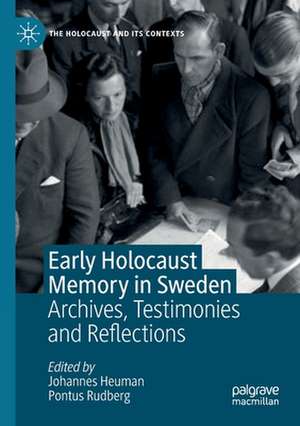Early Holocaust Memory in Sweden: Archives, Testimonies and Reflections: The Holocaust and its Contexts
Editat de Johannes Heuman, Pontus Rudbergen Limba Engleză Paperback – 2 dec 2021
| Toate formatele și edițiile | Preț | Express |
|---|---|---|
| Paperback (1) | 891.48 lei 6-8 săpt. | |
| Springer International Publishing – 2 dec 2021 | 891.48 lei 6-8 săpt. | |
| Hardback (1) | 896.70 lei 6-8 săpt. | |
| Springer International Publishing – dec 2020 | 896.70 lei 6-8 săpt. |
Din seria The Holocaust and its Contexts
-
 Preț: 280.93 lei
Preț: 280.93 lei - 20%
 Preț: 690.43 lei
Preț: 690.43 lei -
 Preț: 307.44 lei
Preț: 307.44 lei - 20%
 Preț: 690.74 lei
Preț: 690.74 lei - 18%
 Preț: 890.68 lei
Preț: 890.68 lei -
 Preț: 392.60 lei
Preț: 392.60 lei - 15%
 Preț: 693.39 lei
Preț: 693.39 lei - 15%
 Preț: 643.34 lei
Preț: 643.34 lei - 15%
 Preț: 642.36 lei
Preț: 642.36 lei - 18%
 Preț: 734.44 lei
Preț: 734.44 lei -
 Preț: 392.60 lei
Preț: 392.60 lei - 18%
 Preț: 728.11 lei
Preț: 728.11 lei -
 Preț: 386.81 lei
Preț: 386.81 lei - 18%
 Preț: 782.42 lei
Preț: 782.42 lei - 18%
 Preț: 894.03 lei
Preț: 894.03 lei -
 Preț: 387.75 lei
Preț: 387.75 lei - 18%
 Preț: 723.06 lei
Preț: 723.06 lei - 15%
 Preț: 589.51 lei
Preț: 589.51 lei - 18%
 Preț: 730.35 lei
Preț: 730.35 lei -
 Preț: 390.25 lei
Preț: 390.25 lei - 15%
 Preț: 592.77 lei
Preț: 592.77 lei - 18%
 Preț: 730.47 lei
Preț: 730.47 lei - 15%
 Preț: 644.18 lei
Preț: 644.18 lei - 9%
 Preț: 642.67 lei
Preț: 642.67 lei -
 Preț: 197.26 lei
Preț: 197.26 lei -
 Preț: 382.36 lei
Preț: 382.36 lei -
 Preț: 483.92 lei
Preț: 483.92 lei - 18%
 Preț: 780.16 lei
Preț: 780.16 lei -
 Preț: 388.72 lei
Preț: 388.72 lei -
 Preț: 394.51 lei
Preț: 394.51 lei
Preț: 891.48 lei
Preț vechi: 1087.17 lei
-18% Nou
Puncte Express: 1337
Preț estimativ în valută:
170.58€ • 178.61$ • 141.49£
170.58€ • 178.61$ • 141.49£
Carte tipărită la comandă
Livrare economică 10-24 aprilie
Preluare comenzi: 021 569.72.76
Specificații
ISBN-13: 9783030555344
ISBN-10: 3030555348
Pagini: 334
Ilustrații: XIII, 334 p. 2 illus.
Dimensiuni: 148 x 210 mm
Greutate: 0.46 kg
Ediția:1st ed. 2021
Editura: Springer International Publishing
Colecția Palgrave Macmillan
Seria The Holocaust and its Contexts
Locul publicării:Cham, Switzerland
ISBN-10: 3030555348
Pagini: 334
Ilustrații: XIII, 334 p. 2 illus.
Dimensiuni: 148 x 210 mm
Greutate: 0.46 kg
Ediția:1st ed. 2021
Editura: Springer International Publishing
Colecția Palgrave Macmillan
Seria The Holocaust and its Contexts
Locul publicării:Cham, Switzerland
Cuprins
Introduction: Holocaust Memory in Sweden: A Re-evaluation; Johannes Heuman & Pontus Rudberg.- 1. 'The Sentenced to Death Testifies': The Tegen’s and their Collection of Holocaust Testimonies; Lars M. Andersson.- 2. The Collection of Survivor Testimonies of the Polish Research Institute in Sweden; Izabela Dahl.- 3. In Search for Documents: Nella Rost and the Jewish Historical Commission in Stockholm; Johannes Heuman.- 4. Holocaust Testimonies in Jewish Claims for Restitutions; Pontus Rudberg.- 5. 'The Greatest Pogrom in World History’: Hugo Valentin and the Holocaust; Olof Bortz.- 6. Tracing the Holocaust in Swedish Post-War Literature; Karin Kvist Geverts.- 7. The Swedish Press and the Construction of Early Holocaust Narratives, 1945-1950; Antero Holmila.- 8. Dire Strait? When the Holocaust Came to Sweden: A Regional Perspective, 1943-1945; Ulf Zander.- 9. Jews, Gender and the Scandinavian Subject in the film Vittnesbördet; Kristin Wagrell.- 10. The Holocaust and the Jewish Survivors in the Swedish Jewish Press, 1945-1955; Malin Thor Tureby.- 11. The Ethical Dimension of Memory: Swedish-Jewish Reactions to Justice and Retribution; Julia Sahström.- Conclusion; Hasia Diner.
Notă biografică
Johannes Heuman is Senior Lecturer in History at Jönköping University, Sweden. He has worked as a researcher at the Hugo Valentin Centre at Uppsala University, Sweden, l'Institut d'histoire du temps présent (CNRS) and the Centre Alberto-Benveniste (EPHE) in Paris, France.
Pontus Rudberg is Researcher at the Hugo Valentin Centre, Uppsala University, Sweden. He is currently working on a project about the rehabilitation and integration of Holocaust survivors in Sweden and leads the Swedish part of the Rothschild Foundation Europe’s Yerusha project.
Textul de pe ultima copertă
This book investigates the memory of the Holocaust in Sweden and concentrates on early initiatives to document and disseminate information about the genocide during the late 1940s until the early 1960s. As the first collection of testimonies and efforts to acknowledge the Holocaust contributed to historical research, judicial processes, public discussion, and commemorations in the universalistic Swedish welfare state, the chapters show the challenges and opportunities that were faced in addressing the traumatic experiences of a minority. In Sweden, the Jewish trauma could be linked to positive rescue actions instead of disturbing politics of collaboration, suggesting that the Holocaust memory was less controversial than in several European nations following the war. This book seeks to understand how and in what ways the memory of the Holocaust began to take shape in the developing Swedish welfare state and emphasises the role of transnational Jewish networks for the developing Holocaust memory in Sweden.
Caracteristici
Investigates the memory of the Holocaust in Sweden in the twentieth century Concentrates on early initiatives to document and disseminate information about the genocide from the late 1940s until the early 1960s Emphasises the role of transnational Jewish networks for the developing Holocaust memory in Sweden
